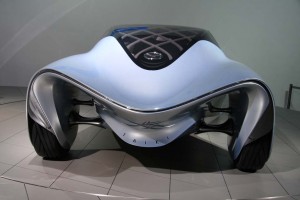
The Tokyo Motor Show has been best known for its wild, weird and often wacky concept vehicles, like the Mazda Taiki.
What if you gave a show and nobody came? That’s the problem facing organizers of the Tokyo Motor Show.
Call it death by a thousand cuts. The once-major extravaganze is slowly bleeding to death as one foreign manufacturer after another pulls out from a show seen as increasingly irrelevant. The latest to pull out of the biennial event is Hyundai, and that means that all the major foreign players – North Americans like GM, Ford and Chrysler, Europeans such as BMW and Mercedes-Benz, and the Koreans – have decided to skip Tokyo this year.
Whether they’ll be back in the future is highly unlikely. Instead, the industry seems more than happy to leave the Tokyo Motor Show to the Japanese makers and focus on the alternating Beijing and Shanghai Motor Shows.
A decade ago, this would have been unthinkable. For one thing, China was a closed market, its tiny domestic industry selling mostly to government officials and a small cadre of approved businessmen. Today, however, despite some government hoops and hurdles, China is a surprisingly free and open market – indeed, the biggest national automotive market in the world, having pushed past the recession-plagued United States early in 2009.
While Japan continues to insist it’s also an open market, it would be hard to guess that from the outside. Sales of all foreign brands combined barely nudge into double-digit territory, despite decades of effort; by comparison, foreign brands account for 55% of the U.S. market and a growing share in Europe. And even if Japan really did open up, the market is in the midst of one of its worst slumps ever, with few predicting a serious revival anytime soon.
As for the Tokyo Motor Show itself, it’s never been a favorite of foreign manufacturers who were typically given bad locations to display their wares and poor timeslots for their news conferences.
Nonetheless, Japanese officials seem surprised by the news. “Unbelievable,” declared Toyokazu Ishida, who runs the event for the Japan Automobile Manufacturers Association, said in an interview with Automotive News. Not really. The foreign manufacturers have been signaling for several years that they were tired of the way they have been treated, both by show organizer JAMA, and by the Japanese government. Several walked away from the 2007 show, and others, such as Mercedes-Benz, notably scaled back their presence at Makuhari Messe, the site of the show. Mercedes decided, two years ago, to cancel a major product launch and save it for the Detroit Auto Show, a few months later.
In fact, Tokyo isn’t the only auto show in trouble. Detroit itself saw a half dozen makers walk away last January – including Japan’s Nissan and Germany’s Porsche – and the organizers at the Detroit Auto Dealers Association are struggling to prevent further defections as they prepare for the January 2010 event.
“Auto shows don’t sell cars,” contends Mike Jackson, the outspoken CEO of mega-retailer AutoNation, and the former head of Mercedes-Benz in the U.S. Not everyone agrees with that assessment. The DADA is quick to produce data showing that a large share of show-goers will buy a vehicle within 12 months after attending an event like Detroit’s North American International Auto Show.
But is the price worth the payoff? Even a small display at a major show, like Tokyo, Detroit or Frankfurt, will typically cost a manufacturer $2 million or more. It’s been estimated that BMW spent more than $30 million on its display at the just-completed Frankfurt Motor Show, which included an indoor track, which treated visitors to the sight of the automaker’s latest products in action.
“I don’t see them (auto shows) going away entirely,” says Dieter Zetsche, CEO of Mercedes’ German parent, Daimler AG, “but there’ll be some consolidation as manufacturers focus on the stronger and more important ones.”
Tokyo seems likely to be the first of the big international shows to feel the pressure of consolidation. A few months ago, JAMA gave thought to cancelling the biennial event, but apparently couldn’t afford to lose face. Even if they keep it going, it will almost certainly decline in importance to little more than a regional event where Japanese makers like Toyota, Honda and Nissan will roll out the traditional mix of new products and wacky concept vehicles.
The question is whether some of the other big auto shows will follow as the industry consolidates.
